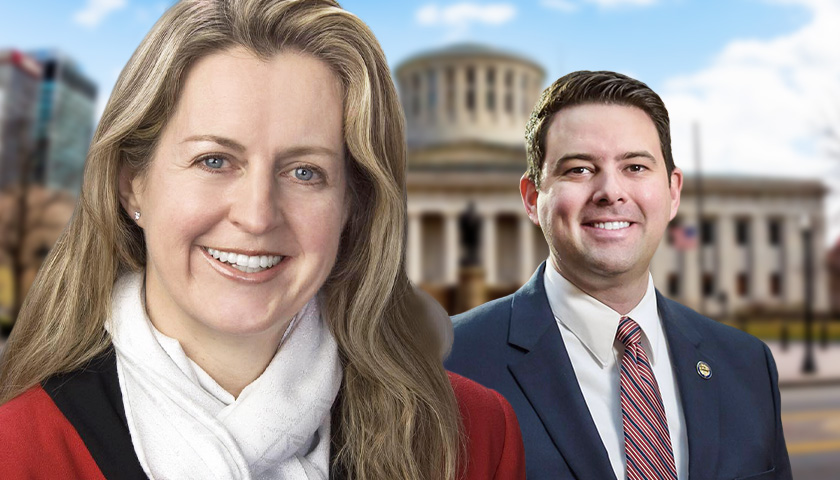Advocates for occupational licensing reform successfully urged an Ohio House panel on Tuesday to unanimously pass a Senate bill to recognize professional certifications awarded by other states.
Eighteen states already recognize out-of-state licenses for most professions, including neighboring Pennsylvania. These universal-recognition laws require the licensee to have current permission to work in his or her state and have no pending professional disciplinary matters or disqualifying criminal records. Licensees remain subject to any fees or testing required by their adopted states.
Ohio requires licensing for over 650 different trades. The measure to reform this policy area, sponsored by State Senators Kristina Roegner (R-Hudson) and Rob McColley (R-Napoleon), passed their chamber unanimously in June. Backers of the reform told the Ohio House State And Local Government Committee that its passage would make the Buckeye State more economically competitive.
Former State Representative and current Ohio Chamber of Commerce Vice President Rick Carfagna told his erstwhile colleagues that his organization’s member businesses consistently report maintaining a qualified workforce as their most pressing challenge. He also said that Ohio’s population growth lags significantly compared with most other states.
“Simply put, our state must consider policies, recruitment campaigns, incentives and advocacy not just to recruit out-of-state workers but also to welcome back the millions of Ohioans who have fled the state over time,” he said. “Senate Bill 131 can help address this problem because occupational licensing effects more than 20 percent of the workforce and Ohio’s occupational licensing is more complex and more restrictive than many comparison states.”
Carfagna’s assertion about the scope of occupational licensure’s effect on the working population matches a 2018 analysis by University of Minnesota labor experts Evgeny S. Vorontikov and Morris M. Kleiner. Therein, the two scholars posited that licensing may cost the national economy between $6.2 and $7.1 billion annually just in terms of lost output. They suggest, however, that when misallocated resources are considered, the actual cost to the economy is likelier to be nearly $200 billion.
Carfagna also recalled that, in 2015, President Barack Obama commissioned a report on occupational licensing, which found the practice can “reduce employment opportunities and lower wages for excluded workers” [i.e., those who cannot afford to pursue the certification requirements]. The White House report also found that the mandates can lead to higher consumer prices without improving product or service quality.
Representatives also heard from Alan Smith, midwest director of the center-right R Street Institute, who warned the lawmakers that economic trends in the Buckeye State are extremely sobering. Ohio, he said, has seen a greater share of its taxable income — about 25 percent — migrate out of state over the last two decades than any other state did other than New York, Illinois, and Michigan.
Smith said Arizona, a pioneering state in the area of credential reform, shows a way forward for Ohio, at least on this facet of public policy. He reported that about 5,000 professionals in Arizona have applied to have their preexisting licenses recognized in their new state.
“You can’t talk to [Arizona Republican Governor Doug] Ducey without him bringing this up in conversation because he’s very proud of what they’ve been able to do,” he said.
Ohio legislators crafted the Roegner-McColley bill in consultation with the Columbus-based Buckeye Institute, whose research fellow Greg R. Lawson testified Tuesday. He said that while many economic reforms are needed to provide the state with the “tapestry of good policy” that will foster robust economic growth, universal licensing recognition is a critical component. He also said it is a matter of fairness toward reputable professionals.
“People in good standing should be able to cross the state border, come here, make Ohio their home and do it without having to jump over a ton of hurdles,” he said.
Chris Ferruso, legislative director of the National Federation of Independent Business in Ohio, expressed similar hope for those who wish to bring their skill sets to the Buckeye State.
“The reality is, licensed individuals do not lose their skills simply by leaving one state and coming to Ohio,” Ferruso averred. “And we believe Senate Bill 131 protects Ohioans by ensuring individuals seeking licensure are qualified under existing Ohio requirements.”
The Ohio State Legislative session adjourns on December 21, giving representatives and Governor Mike DeWine (R) one week to enact the bill.
– – –
Bradley Vasoli is managing editor of The Ohio Star. Follow Brad on Twitter at @BVasoli. Email tips to [email protected].
Photo “Kristina Roegner” by Elect Kristina Daley Roegner. Photo “Rob McColley” by Senator Rob McColley. Background Photo “Ohio Statehouse” by General Ization. CC BY 3.0.





